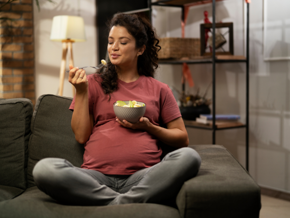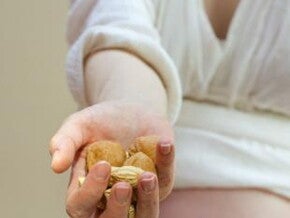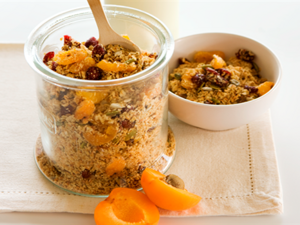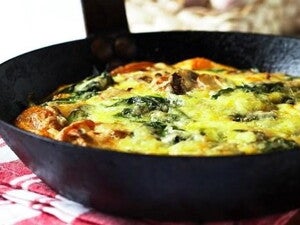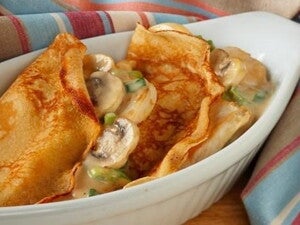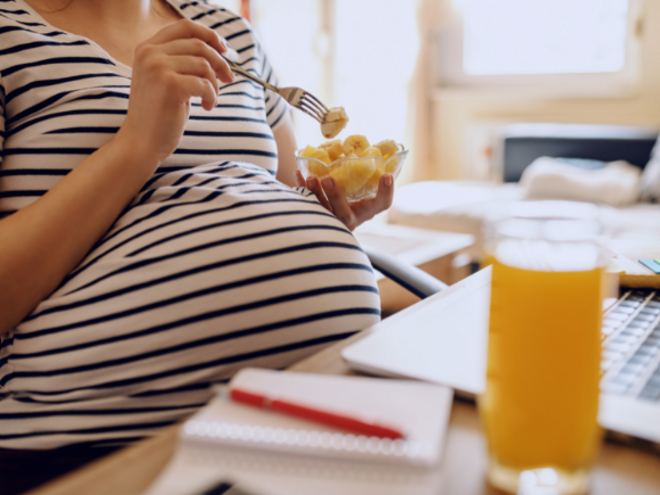
Pregnancy Food: Nourish You and Your Baby
By Marika Day, Accredited Practising Dietitian and Nutritionist with over a decade of experience in the areas of women’s health, gastrointestinal nutrition and disordered eating.
Planning nutritious, well-balanced foods to eat while pregnant is one of the best ways to support maternal and foetal health.
During pregnancy, mothers need to prioritise foods rich in essential vitamins, minerals, and other nutrients to encourage the healthy growth and development of their baby. In addition, a healthy diet can help mums manage energy levels, reduce pregnancy discomfort, and even support mood. Eating well also contributes to reducing the risk of pregnancy complications such as preterm labour, and can help ensure a smooth recovery postpartum. Let’s have a look at the essential nutrients and food choices that can help you nourish both yourself and your baby.
Essential nutrients for pregnancy
Eating a nutrient-dense diet is key during pregnancy, as the body’s nutrient demands increase to support the developing baby. Here are some of the most important nutrients during pregnancy:
- Folic acid: This B vitamin helps prevent neural tube defects in the baby’s spine and brain. It’s most crucial before conception and in early pregnancy, as the neural tube forms very early.
- Iron: Required to support increased blood volume and the baby’s development. Iron can help prevent anaemia, which may cause fatigue and lead to a lower iron status in your baby when they are born.
- Calcium: Essential for building your baby’s bones and teeth, calcium also supports your body as it undergoes significant changes.
- Protein: Required for the growth of foetal tissue, including the brain, protein needs can easily be met by incorporating a mix of lean meats, eggs, and plant-based proteins.
- Omega-3 fatty acids: These healthy fats, especially DHA, are essential for brain and eye development in the foetus.
- Dietary fibre: Fibre helps maintain regular bowel movements, especially as pregnancy compresses digestive organs.
A balanced pregnancy diet includes foods from all five food groups: vegetables, fruits, whole grains, lean proteins, and dairy or dairy alternatives. For a deeper dive into a well-rounded pregnancy diet, read our pregnancy nutrition article.
What are some good foods for pregnancy?
Choosing nutrient rich foods is key to supporting your body in each trimester of pregnancy. Below are some of the foods that benefit both mother and baby:
- Fruits and vegetables: Packed with vitamins, minerals, and fibre, fruits and vegetables can aid digestion and provide antioxidants that protect cells. Try a colourful salad with greens, tomatoes and carrots, or a fruit smoothie for breakfast, incorporating fibre to prevent constipation and vitamins for energy.
- Whole grains: Brown rice, oats, and whole grain bread are excellent sources of B vitamins and fibre, helping maintain energy levels. Breakfast muesli with berries or a quinoa salad with veggies make for balanced meals.
- Lean proteins: Eggs, chicken, and legumes provide high quality protein and iron. For a nutritious meal, try a vegetable omelette or a lentil and spinach dhal.
- Dairy or dairy alternatives: Milk, yogurt, and cheese offer calcium, protein, and vitamin D. A snack of Greek yogurt with nuts and berries makes a calcium-rich snack. Choose calcium fortified dairy alternatives if you are unable to consume dairy products.
Simple recipe ideas:
- Spinach, chickpea and tuna salad: High in folate, iron, omega-3 fatty acids and protein. Supports mother’s energy levels and baby’s tissue development.
- Avocado and egg wholegrain toast: Provides protein, folic acid, and healthy fats for brain development.
- Quinoa bowl with veggies and chicken: A balanced meal with lean protein, fibre, and B vitamins that aid in energy production and support foetal growth.
For more recipe ideas, check out our pregnancy recipes.
What are good pregnancy snacks?
Maintaining energy throughout the day can be challenging, and healthy snacks for pregnancy are an easy way to meet nutritional needs while managing cravings. Here are a few snack ideas that are easy to prepare and nutrient-dense:
- Apple slices with almond butter: The combination of fibre and healthy fats keeps you full longer, while the protein in almond butter supports muscle and tissue growth.
- Greek yogurt with berries and nuts: Rich in protein and calcium, this snack supports bone health and provides antioxidants.
- Hummus with vegetable sticks: Loaded with fibre, folic acid, and iron, hummus with carrots or cucumber is a quick snack that helps support digestion and energy levels.
- Smoothies: Try a smoothie made with spinach, banana, peanut butter and milk to load up on calcium, potassium, and fibre.
- Whole-grain crackers with cottage cheese + tomato: A protein and calcium rich choice for a mid-morning snack.
When selecting store-bought snacks, look for options low in sugar and salt, such as plain nuts, wholegrain crackers, or a small piece of dark chocolate or small serve of dried fruit. These options can satisfy cravings while providing some nutrition.
Foods to eat while pregnant: Tips for a balanced diet
Eating balanced meals during pregnancy can help you meet nutrient requirements without overloading on calories. Aim to include a variety of foods on your plate to ensure you’re getting different nutrients each day.
What are some good pregnancy meals?
- Vegetable stir-fry with tofu: A plant-based protein source with fibre-rich veggies to support digestion. Serve with brown rice or quinoa.
- Whole-grain pasta with spinach and grilled chicken: Provides protein, fibre, and iron. Stir through pesto for flavour and healthy fats.
- Sweet potato and black bean tacos: A filling, fibre-packed option rich in vitamins A and C.
Staying hydrated is super important during pregnancy and you can’t beat water. If you want some variation at times, try herbal teas, coconut water, freshly squeezed orange juice, or a mineral water with lime.
Pregnant women should also be mindful of avoiding foods like deli meats, unpasteurised cheeses, and high-mercury fish. For more information on foods to avoid, read our foods to avoid during pregnancy article.
Simple food swaps: Good foods for pregnancy
Making small changes in your diet can improve its quality and support your pregnancy needs. Here are a few simple food swaps to try:
- Swap white bread and crackers for whole-grain bread and crackers to increase fibre and B vitamins.
- Choose oats for breakfast or wholegrain cereals rich in fibre.
- Choose natural yoghurt over regular fruit yoghurt for less sugar.
- Choose lean cuts of meat over processed or fatty meats to reduce sodium and saturated fat intake.
- Swap soft drinks for sparkling water with fruit slices to limit sugar.
- Replace potato chips with air-popped popcorn for a high-fibre snack.
Each of these small changes helps enhance nutrient intake, supporting a healthy pregnancy for both mum and baby.
Frequently asked questions about pregnancy food
When do pregnancy food cravings start?
Pregnancy food cravings typically begin in the first trimester; however they can vary widely among individuals. Some women may experience cravings earlier, while others may not notice them until later in their pregnancy, or not at all. These cravings can be influenced by hormonal changes, nutritional needs, and personal preferences. If you have specific concerns or questions about pregnancy cravings, it is advisable to talk to a nutrition expert.
What are the healthy foods to eat during pregnancy?
During pregnancy, focus on a balanced diet including a variety of fruits and vegetables, whole grains, lean proteins, dairy products, healthy fats, legumes, and nuts. Stay hydrated with water. Avoid raw or undercooked foods, unpasteurized dairy, and high-mercury fish. Consult the expertise of a dietitian for personalised advice to meet your specific dietary needs.
What are healthy snacks for pregnancy?
Healthy snacks during pregnancy can help maintain energy levels and provide essential nutrients. Some nutritious options can include Fresh fruits (apples, bananas, berries); Vegetable sticks (carrot, cucumber, and capsicum can be paired with hummus or yoghurt dip); Nuts and seeds provide healthy fats and protein; Whole grain crackers (pair with cheese or nut butter for a satisfying snack); Air-popped popcorn (limit too much salt and butter); and Smoothies (blend fruits, spinach, yoghurt, and milk). These snacks can help meet nutritional needs while keeping cravings at bay.
What are pregnancy super foods?
Pregnancy superfoods are nutrient-dense foods that provide essential vitamins and minerals to support the health of both mum and developing baby. Some examples of pregnancy superfoods include Leafy greens (spinach and kale, rich in folate and iron); Berries (blueberries, strawberries, and raspberries are high in antioxidants, vitamins, and fibre); Avocados (packed with healthy fats and potassium); and Salmon: (a great source of omega-3 fatty acids).
Sources:
• Australian Guide to Healthy Eating Website. Accessed at https://www.eatforhealth.gov.au/eating-well/healthy-eating-throughout-all-life/healthy-eating-when-you're-pregnant-or-breastfeeding
• Pregnancy, Birth and Baby Website. Accessed at https://www.pregnancybirthbaby.org.au/partners/nutrition-australia

